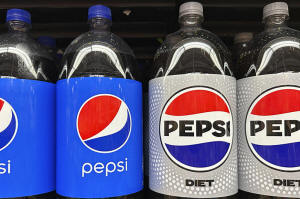Al Sharpton calls on PepsiCo to restore DEI initiatives, threatens
boycott
[April 05, 2025] By
GRAHAM LEE BREWER
The Rev. Al Sharpton is giving PepsiCo three weeks to meet with him — or
suffer a boycott — to discuss reversing the company’s recent move to do
away with its diversity, equity and inclusion initiatives, according to
a letter shared with The Associated Press.
On Friday, Sharpton wrote to PepsiCo CEO Ramon Laguarta expressing his
“profound disappointment” that the company would end inclusion
commitments that both helped build its brand and fostered trust with
millions of its customers.
“You have walked away from equity,” Sharpton wrote in the letter, adding
that removing DEI hiring and retention goals and dismantling community
partnerships with minority organizations “are clear signals that
political pressure has outweighed principle.”
Sharpton, founder and president of the National Action Network,
announced in January that the civil rights organization would identify
two companies in the next 90 days that will be boycotted for abandoning
their DEI pledges.
A spokesperson for PepsiCo said it had not received the letter and was
unable to comment.
PepsiCo is one of the largest food and beverage companies in North
America. Its brands include Gatorade, Lay’s potato chips, Doritos,
Mountain Dew as well as Pepsi.

In a memo sent to employees in February, Laguarta said the company will
no longer set goals for minority representation in its managerial roles
or supplier base.
Since President Donald Trump returned to the White House earlier this
year, U.S. government agencies, companies and schools have scrambled to
reevaluate policies and programs aimed at increasing diversity among its
employees and reducing discrimination against members of minority
groups, women and LGBTQ+ people.
Trump ended DEI programs within the federal government and has warned
schools to do the same or risk losing federal money. Large retailers
like Walmart and Target have also phased out DEI initiatives since Trump
took office.
Following decades of activism and protests by marginalized groups,
several pieces of legislation and executive orders in the 1960’s laid
the groundwork for what would become known today as the Diversity,
Equity, and Inclusion movement in the workplace. In the 1970’s, in
response to the new laws and regulations, affirmative action policies
were introduced, employee resource groups started to emerge, and
businesses began implementing diversity trainings. This led to increased
hiring of women and minorities.
[to top of second column] |

Plastic bottles of Pepsi are displayed at a grocery store in New
York on Nov. 15, 2023. (AP Photo/Ted Shaffrey, File)
 By the 1980’s, new studies began
highlighting the business incentive for fostering inclusive
workplaces. Focus shifted from compliance with the law to “creating
an environment where everybody feels that they can achieve their
highest goal,” said Mary-Frances Winters, an author and strategist
focusing on diversity and organizational development. “This was
really about looking at changing demographics, looking at who was
coming into the workforce and also looking at how people with
different backgrounds can lead to greater innovation,” Winters said.
Research continued to emphasize that diversity in the workplace was
a matter of business survival, with some businesses even beginning
to mandate cultural competency within leadership. PepsiCo was one of
those companies, Sharpton pointed out in his letter.
In the 1940s and 1950s, PepsiCo hired some of the first Black sales
and marketing executives in corporate America, Sharpton wrote, and
by the 1980’s the company’s policies led to the creation of Black
consumer advisory boards.
“You did this not because it was easy — but because it was right,”
Sharpton wrote in the letter. “That legacy is now in jeopardy.”
In the early 2000's, Sharpton sat on PepsiCo's African American
advisory board.
PepsiCo’s announcement in February that it would rollback inclusion
efforts came as Coca-Cola reaffirmed support for its DEI efforts. In
its annual report, Atlanta-based Coke warned that the inability to
attract employees that reflect its broad range of customers could
negatively affect its business.
“Failure to maintain a corporate culture that fosters innovation,
collaboration and inclusion … could disrupt our operations and
adversely affect our business and our future success,” the company
said.
All contents © copyright 2025 Associated Press. All rights reserved
 |